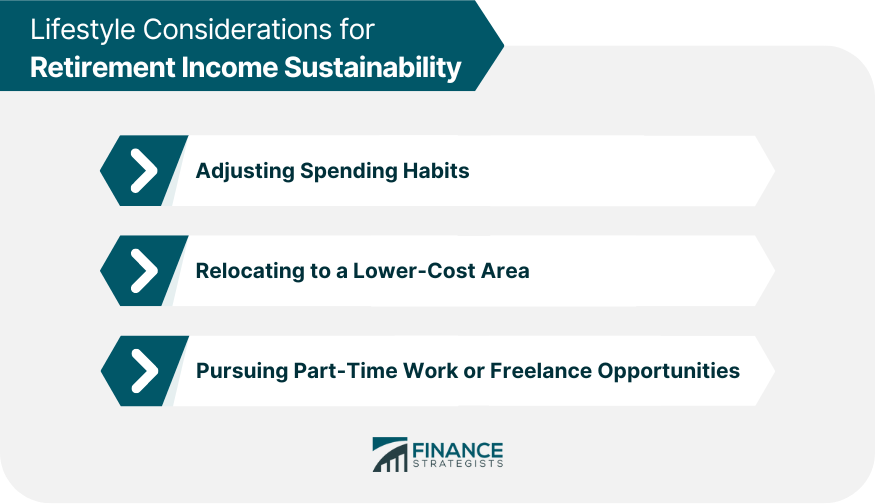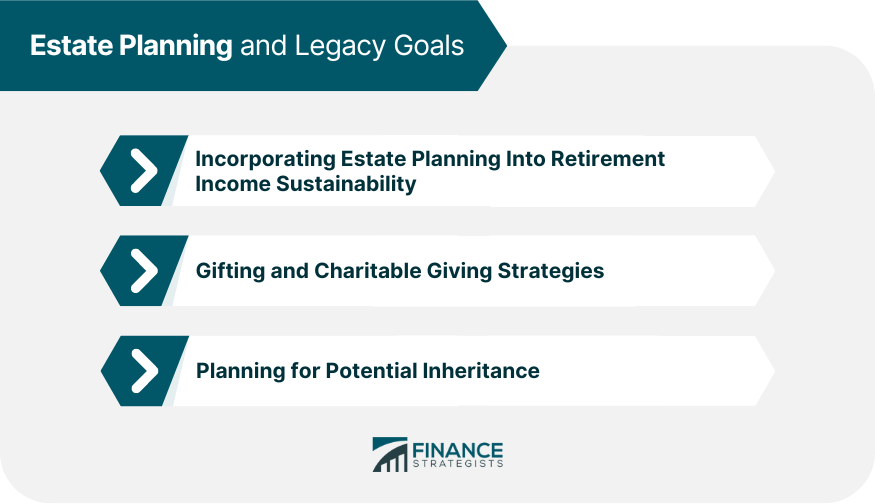Sustainable retirement income is crucial for ensuring financial security and stability throughout the retirement years. A well-planned retirement income strategy can help retirees maintain their desired lifestyle, navigate market fluctuations, and reduce the risk of outliving their savings. Various factors, such as investment risks, inflation, healthcare costs, and tax planning, can impact the sustainability of retirement income. By understanding and addressing these factors, retirees can develop a comprehensive retirement income plan that meets their unique financial needs and goals. One of the keys to sustainable retirement income is starting to save early and consistently. By doing so, individuals can take advantage of compounding interest and maximize their retirement savings. A diversified investment portfolio can help individuals reduce risk and achieve long-term growth, leading to more sustainable retirement income. A systematic withdrawal plan involves collecting a specific amount of money from a retirement account at regular intervals. By adhering to a carefully planned withdrawal strategy, individuals can help ensure their retirement income lasts throughout their lifetime. Annuities are financial products that can provide a guaranteed income stream during retirement. By incorporating annuities into their retirement income plan, individuals can help ensure a sustainable income source. Diversifying retirement assets across various investment types, such as stocks, bonds, and real estate, can help reduce risk and increase the sustainability of retirement income. Maintaining an appropriate asset allocation based on risk tolerance and time horizon, and regularly rebalancing the portfolio, can help manage investment risk and support a sustainable retirement income. Understanding personal risk tolerance and time horizon is crucial for developing an investment strategy for retirement income sustainability. Inflation erodes the purchasing power of money, which can have a significant impact on retirement income sustainability. Retirees must consider the effects of inflation when planning their retirement income strategy. Inflation-protected investments, such as Treasury Inflation-Protected Securities (TIPS), can help retirees preserve their purchasing power and support a sustainable retirement income. By adjusting withdrawal rates to account for inflation, retirees can help ensure their retirement income remains sustainable. Healthcare costs can be a significant expense during retirement and can have a considerable impact on retirement income sustainability. Estimating future healthcare expenses is essential for developing a comprehensive retirement income plan. Long-term care needs, such as assisted living or nursing home care, can be costly and can significantly affect retirement income sustainability. Planning for potential long-term care needs is a critical aspect of retirement income planning. Retirees can employ various strategies to manage healthcare costs, such as purchasing long-term care insurance, contributing to a Health Savings Account (HSA), or exploring alternative healthcare options. Different retirement income sources have varying tax implications, impacting sustainability. Understanding the tax consequences of various income sources is essential for effective retirement income planning. Implementing tax-efficient withdrawal strategies, such as strategically withdrawing from taxable and tax-deferred accounts and considering Roth conversions, can help retirees optimize their retirement income and improve sustainability. Understanding the optimal time to claim Social Security benefits can have a significant impact on retirement income sustainability. Retirees should consider their expected longevity, spousal benefits, and break-even points when deciding when to claim Social Security. Choosing the appropriate pension benefit option, such as a single-life or joint-life annuity, can be crucial in ensuring sustainable retirement income. Retirees should carefully evaluate their options and consider their personal circumstances when making this decision. Various types of annuities, such as immediate, deferred, fixed, and variable annuities, can provide a steady stream of income during retirement. Understanding the differences between these annuity products can help retirees choose the best option for their retirement income plan. While annuities can provide a guaranteed income source during retirement, they also come with potential drawbacks, such as fees, surrender charges, and the financial strength of the issuing insurance company. Retirees should carefully weigh the pros and cons of annuities before incorporating them into their retirement income plan. Guaranteed income products, such as annuities and fixed-income investments, can help provide a steady stream of income during retirement. Retirees should evaluate these products based on factors such as fees, payout options, and the financial strength of the issuer. Determining a safe withdrawal rate, which is the percentage of retirement assets that can be withdrawn annually without the risk of running out of money, is crucial for ensuring retirement income sustainability. The 4% rule is a commonly used guideline, but retirees should consider their unique circumstances when determining their safe withdrawal rate. Dynamic withdrawal strategies, which involve adjusting withdrawal rates based on market performance and personal circumstances, can help individuals maintain a sustainable income throughout their retirement. Sequence of returns risk refers to the possibility that negative investment returns early in retirement can deplete a retiree's assets prematurely. Managing this risk through appropriate asset allocation and withdrawal strategies is essential for sustainable retirement income. By adopting a more frugal lifestyle and cutting back on discretionary expenses, individuals can help ensure their retirement income remains sustainable. Moving to a lower-cost area with a more affordable cost of living can help individuals stretch their retirement income further, improving sustainability. Working part-time or freelancing during retirement can provide additional income, helping individuals maintain a sustainable retirement income. Estate planning can play a critical role in retirement income sustainability by ensuring that assets are passed on to heirs in a tax-efficient manner and according to the individual's wishes. Strategies such as gifting and charitable giving can help individuals achieve their legacy goals while also providing potential tax benefits, contributing to retirement income sustainability. Inheritance from a deceased family member or friend can provide a financial boost to a retiree's income. However, relying solely on inheritance can be unpredictable and should not be the primary source of retirement income. Financial advisors can help retirees develop a comprehensive retirement income plan, taking into account individual financial goals, risk tolerance, and retirement timeline. Certified Financial Planners and retirement income planning specialists are financial professionals with specialized training in retirement planning, investment management, and other areas of personal finance. They can provide expert guidance on optimizing retirement income sources and ensuring sustainability. Planning for retirement income sustainability is essential for achieving financial security and peace of mind during retirement. A well-rounded retirement income plan can help individuals maintain their desired lifestyle, navigate market fluctuations, and reduce the risk of outliving their savings. Retirees should regularly review and adjust their retirement income strategies to account for changes in their financial situation, the economic environment, and personal circumstances. Working with financial professionals can help individuals stay on track and achieve their retirement goals. By understanding the various factors that impact retirement income sustainability and implementing appropriate strategies, individuals can achieve financial security and peace of mind during this life stage.Retirement Income Sustainability: Overview
Retirement Savings Strategies
Accumulation Phase
Saving Early and Consistently
Diversifying Investments
Decumulation Phase
Systematic Withdrawal Plans
Annuities
Managing Investment Risks
Diversification
Asset Allocation and Rebalancing
Risk Tolerance and Time Horizon
Inflation and Retirement Income
Impact of Inflation on Retirement Income
Strategies for Managing Inflation Risk
Inflation-Protected Investments
Adjusting Withdrawal Rates
Healthcare Costs
Estimating Healthcare Expenses in Retirement
Planning for Long-Term Care Needs
Strategies for Managing Healthcare Costs
Tax Planning
Understanding Tax Implications of Retirement Income Sources
Tax-Efficient Withdrawal Strategies
Social Security and Pension Income
Maximizing Social Security Benefits
Pension Benefit Options and Considerations
Annuities and Guaranteed Income Products
Types of Annuities
Benefits and Drawbacks of Annuities
Evaluating Guaranteed Income Products
Withdrawal Strategies
Safe Withdrawal Rates
Dynamic Withdrawal Strategies
Sequence of Returns Risk
Lifestyle Considerations for Retirement Income Sustainability
Adjusting Spending Habits
Relocating to a Lower-Cost Area
Pursuing Part-Time Work or Freelance Opportunities

Estate Planning and Legacy Goals
Incorporating Estate Planning Into Retirement Income Sustainability
Gifting and Charitable Giving Strategies
Planning for Potential Inheritance

Working With Financial Professionals
Benefits of Consulting With a Financial Advisor
Certified Financial Planners (CFPs) and Retirement Income Planning Specialists
Conclusion
Retirement Income Sustainability FAQs
Retirement income sustainability refers to the ability of retirees to maintain their desired standard of living throughout their retirement without running out of money.
Several factors can affect retirement income sustainability, including the retiree's longevity, investment returns, inflation, spending habits, and the amount of retirement savings.
Retirees can ensure the sustainability of their retirement income by developing a comprehensive retirement plan that considers all potential income sources, expenses, and risks. This may include reducing expenses, increasing retirement savings, and investing in a diversified portfolio.
The sequence of investment returns can have a significant impact on retirement income sustainability. If a retiree experiences poor investment returns in the early years of retirement, it can reduce the amount of retirement savings available for the remainder of their retirement. This is because retirees must withdraw a fixed percentage of their retirement savings each year, and poor returns early on can result in a smaller pool of savings available for later years.
The 4% rule is a guideline that suggests retirees can withdraw 4% of their retirement savings each year during retirement without running out of money for at least 30 years. However, the 4% rule is not a guarantee and does not consider individual circumstances, so it's important to consult with a financial advisor.
True Tamplin is a published author, public speaker, CEO of UpDigital, and founder of Finance Strategists.
True is a Certified Educator in Personal Finance (CEPF®), author of The Handy Financial Ratios Guide, a member of the Society for Advancing Business Editing and Writing, contributes to his financial education site, Finance Strategists, and has spoken to various financial communities such as the CFA Institute, as well as university students like his Alma mater, Biola University, where he received a bachelor of science in business and data analytics.
To learn more about True, visit his personal website or view his author profiles on Amazon, Nasdaq and Forbes.














